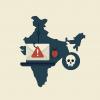Weaponising victimhood: How Khalistanis, Islamists exploit the liberal West
In mid-June 2025, ‘Pro-Khalistan’ group Sikhs for Justice supporters packed Calgary’s City Hall square, waving Khalistan flags and chanting “Kill Modi politics” while demanding that India be “Balkanised” as Prime Minister Narendra Modi attended the G7 summit nearby (Global News, Canada, June 16).





